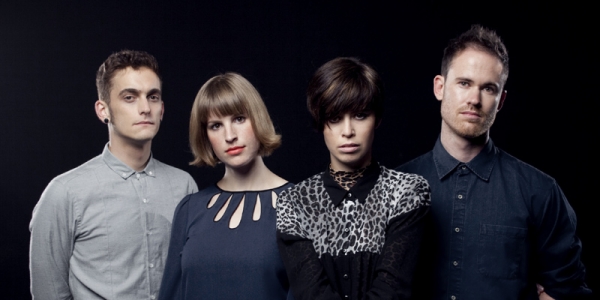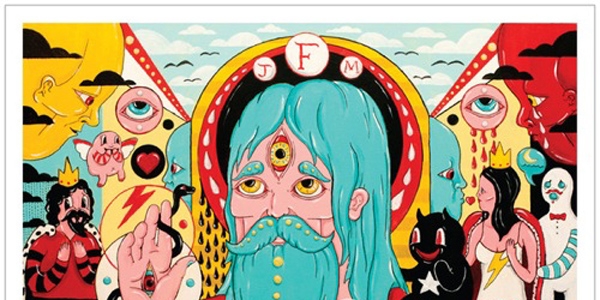When Nik Kaloper, the soft-spoken drummer of Sydney four-piece The Jezabels answers the phone, he finds himself in London, facing the realities of being a touring musician.
“We just finished a European tour and we’re just killing time before we hop on a plane,” he says, a little low on enthusiasm. Kaloper sounds ready to leave London as soon as possible, eager to return home to Australia. It’s a noticeable difference of opinion from Temper Trap, another homegrown talent who’ve entered the public conscience across the world as of late. The two acts share certain similarities; both released their debut in 2009. Both write incredibly contagious, atmospheric rock. And both find themselves with upcoming gigs in Melbourne within a day of each other.
Yet Temper Trap recently decided to move to London as a means to augment their success, begging the question: is it possible for The Jezabels to maintain their roots in Australia or does the only route to permanent success lead out of the country they still call home?
“In a way, and I don’t want to sound too introverted here, but we’re always very concerned about how we’re seen or perceived. We’d love for things to always be as good as possible, but we know they’re not always going to be,” says Kaloper.
Things certainly have been going well for the band as late. Prisoner, the band’s debut peaked at #2 on the ARIA charts and was ultimately awarded the Australian Music Prize. Certifiable household names in Australia, The Jezabels have yet to find worldwide success in the mainstream. For Kaloper, validation doesn’t come from awards or commercial success. As a band, he concedes they’ve managed to appreciate the little things.
“Since we’ve gotten started,” he notes, “we’ve made attempts to look back on particular moments on a record, or moment from a particular show and think about them fondly. And perhaps it’s within those fleeting moments that we get our true validation from.
“Those are within yourself though. To feel validated as an artist is a whole different story though, I guess,” he laughs. “It’s not like you’re a civil servant or you’re working for a charity where you’re actually doing something good. It’s a hard question to answer.”
There will be many more questions the band will have to answer in the future. Despite Prisoner being a comprehensive and incredibly listenable record, album sales aren’t what they used to be. With only a handful of their songs being used for commercial purposes, heightened cash flow hasn’t come easy for The Jezabels.
Long Highway, a six-minute standout track from Prisoner was meant to be used in the recent Twilight films before it was ultimately decided by producers that the song was “too mature” for Twilight audiences.
So The Jezabels find themselves with only one option: get their music out the old fashioned way, by hitting the road for long stretches at a time.
“The next year is simply going to be packed with playing a lot of shows,” says Kaloper. As he continues, his modest demeanour becomes so prevalent that even if the band were granted any commercial success, you’d wonder if they’d even notice.
“In a way I think we’ve had our heads down and have been working hard for so long that we haven’t even had the opportunity to stop and realise any of the success we’ve had.”
The work ethic that seemingly engulfs The Jezabels will take them to 13 countries across four continents as a part of their 2012 touring schedule.
Touring is not simply a requirement of the job for The Jezabels; it’s slowly becoming a way of life.
“I think [touring] affects us heaps as musicians. Not just in the opportunity to bring certain songs to life, but the more you play and the more you put yourself out there in front of people onstage, the more you’ll be able to discover something new within your songs. I think you can really critically and accurately reflect on the past while you’re touring, in terms of songwriting and things you’d like to try in the future. I find as much as we gig, we’re always coming up with new ideas. You can obviously get a little bit tired on the road, you know, working on two or three hours sleep, but it’s a job that none of us can’t imagine doing.”
If wide scale success comes the way of Kaloper and The Jezabels, it won’t be without the requisite grunt-work being put in beforehand. After the band’s last Australian tour, in which they brought cinematic Canadian five-piece Hey Rosetta! along for support, The Jezabels returned the favour by opening for them in considerably smaller venues on their Canadian tour.
“You approach the gig with a different attitude. Certainly I’m a little less vulnerable about the whole thing, ironically. Because you’re the underdog, and people don’t always show up for the openers. They’re thinking, ‘Well I showed up early, you better impress me.’ But sometimes, there’s very little expectations so you just play your show as well as you can and that’s that.”
While it’s incredibly noble in nature, their upcoming tour will see them playing only six shows in their native Australia, a marked difference from their aforementioned 20+ date tour last October/November, which saw them play Australian cities of varied sizes.
“The smaller, rural towns are a little more rowdy and boisterous. They can be tough to compare however, because the gigs in the capital cities are always six or seven times bigger.”
And the way Kaloper tells it, he might prefer to keep their operation toned down.
“The smaller towns certainly feel more local and sometimes, even more comfortable.”
Larger, festival-based tours across the world have presented the band with an intriguing dilemma: have they embraced the opportunity to get their music to audiences larger than they’d find in Australia, with the hopes of finding success abroad or have these tours simply made the band appreciate the success they’ve had in Australia? Kaloper instead presents a third option, and it’s one which may very well end up defining The Jezabels.
“We appreciate playing to any crowd that will listen to us. Whether or not it’s a ‘home’ crowd, it can all be very flattering. At the end of the day we just love being able to play.”
And what they play has rapidly evolved throughout the band’s five year existence. While the band’s three independently released , 2009 and 2010 showed flashes of brilliance, there was still a palpable sense of restraint. Hooks sounded underdeveloped and at times, the songwriting sounded tense.
Yet Prisoner is a fully-formed record, indicative not only of the effort the band has put into better understanding their soun, as a band, but also as people. And live, as evidenced at their stop at The Forum Theatre last November, the band has discovered the ability to turn their songs into far-reaching, graphic pieces that need to be seen as much as they’re heard.It’s a process that The Jezabels may have excelled at, but are still attempting to understand.
“At the songwriting stage, we might be a little short-sighted,” admits Kaloper.
“I wonder if we sometimes get too ahead of ourselves when it comes to the production of the songs because it’s been very difficult to figure out ways to bring those songs to life. Sometimes we’ve got to go through hundreds of different layers when trying to figure out how to make the songs work live. It always takes a bit of rehearsal and re-gigging to get those songs feeling comfortable.”
“It’s something we’ll definitely pay a lot more attention to when writing our next record; how we plan on translating these songs from the album to a live setting.”
With The Jezabels so focused on figuring out what lies ahead for them, they’ve rarely had time to look back. Widescale success may or may not be on the horizon. But whatever happens for the band, there’s one thing they won’t be willing to sacrifice – the pure joy that involves playing together. And that’s one thing that hasn’t changed for the band since the release of Prisoner and hopefully never will.
“With the awards, and even, I suppose, since the album debuted, we were allowed the opportunity to begin doing some things that we hoped people would truly enjoy,” says Kaloper.
“The most exciting thing about any success, for me at least, is the knowledge that we’ll be able to keep going as a band. If only for a little longer. We’ll continue to write more albums and play more shows. We’ll hopefully be able to get better at what we’re doing by continuing to do what we love doing.”
BY JOSHUA KLOKE







